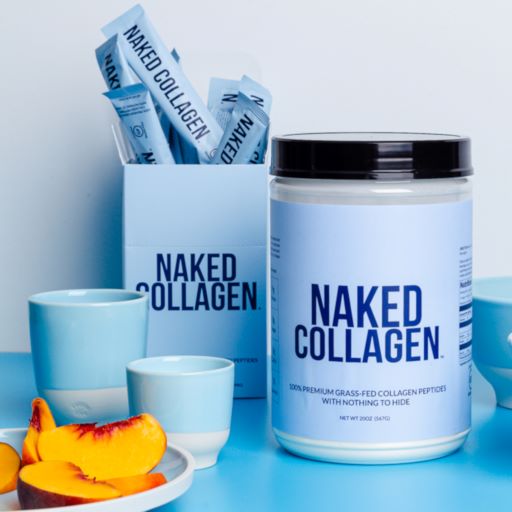Collagen is the most abundant type of protein in the body. Although it’s most known for its role in the muscles and connective tissue, this important protein is actually found almost everywhere.
Although your body makes collagen, it’s possible to become deficient with a poor diet. Aging and some health conditions can also decrease the amount and quality of collagen your body produces.
There’s no way to test for collagen deficiency, but you can take a supplement if you notice collagen deficiency symptoms.
Here are some key symptoms to look for if you’re worried you may be deficient.

Joint Pain
Joint pain or potentially osteoarthritis may happen as a result of collagen deficiency. Cartilage is essential for healthy joints, and collagen is an important part of its structure.
Cartilage wears down without enough collagen, reducing the amount of cushion and flexibility in the joints. This causes pain and may even lead to inflammation and osteoarthritis.
Decreased Mobility
Joint stiffness is a collagen deficiency symptom that someone may experience with or without joint pain. Collagen makes up the structure of cartilage and provides elasticity.
When there is less of it or the quality is poor, the cartilage may deteriorate and become stiffer, and the joints lose range of motion. This may increase the risk of injury as well.
As collagen decreases, so do muscle mass. Therefore, muscle weakness and possibly pain are often collagen deficiency symptoms.
Decreased Skin Integrity
Collagen makes your skin look full and supple. If your body produces less collagen due to aging or another condition, your skin loses its fullness and elasticity. Therefore, the areas around your eyes and cheekbones may appear more hollow.

Some notice thin, “crepey” skin as one of the first collagen deficiency symptoms. Since your skin is less elastic without adequate collagen, it will wrinkle more easily.
Although this usually occurs with aging, it’s possible for premature wrinkling to occur because of inadequate collagen in the diet.
Due to decreased elasticity and impaired structure, wounds may heal more slowly as well.
Gastrointestinal Issues
You may notice issues in the smooth muscle that lines the gastrointestinal tract before you notice symptoms of collagen deficiency elsewhere.
A lack of collagen weakens this muscle and causes issues such as leaky gut syndrome and IBS.
How to Remedy Collagen Deficiency
In order to produce more collagen, your body needs the necessary building blocks like amino acids and certain vitamins and minerals. To help your body produce more collagen, be sure to eat these foods:
-
Foods rich in protein – meat, dairy, eggs, fish, beans
-
Foods rich in vitamin C – citrus, spinach, broccoli, bell pepper, tomato
-
Foods rich in zinc – meat, nuts, beans, seeds, whole grains

The easiest and most efficient way to increase collagen in the body is with a supplement like our collagen protein powder. Collagen peptides are highly soluble, meaning your body will absorb and utilize them quickly.
Research supports the effectiveness of collagen supplementation as well. Studies show that supplementing with collagen peptides helps increase muscle mass, improve skin elasticity, and may slow the progression of arthritis.
Depending on your goals, you may need more or less of a collagen supplement. Although collagen is a very safe supplement, taking too much can cause minor but uncomfortable side effects.
Therefore, make sure you know how much to take before you try a supplement.
Avoid Habits That Damage Collagen
It’s important to avoid damaging the collagen your body already produces, especially if you notice symptoms of deficiency.
Eating Too Much Sugar
When sugar breaks down to glucose, your body produces more insulin. This triggers an inflammatory response that also produces certain enzymes that are known to break down collagen.
Sugar can also attach itself to collagen in the skin, amplifying signs of aging as well as some skin conditions.

Smoking
Tobacco smoke is loaded with chemicals that damage and even destroy collagen. Even secondhand smoke can be damaging to the skin’s collagen, leading to wrinkling and slow wound healing.
Exposing Your Skin To UV Sunlight
Most people know that too much sun can speed up the aging process for your skin. When the skin absorbs UVA rays from the sun, it triggers the production of enzymes that target and break down collagen.
This can occur even if a person isn’t exposed enough to get a sunburn.
Limiting or avoiding these habits will help your body retain collagen and prevent unwanted symptoms of breakdown or deficiency.
Final Thoughts
Collagen is an important building block for the skin, muscles, joints, and soft tissues in the body. Although deficiency is possible due to poor diet, it’s also important to recognize deficiency symptoms that may occur as a result of aging.
Using a collagen supplement is a safe way to prevent and even remedy some symptoms of collagen deficiency.
However, it’s also important to eat a healthy diet and avoid habits and other factors that contribute to collagen breakdown.






